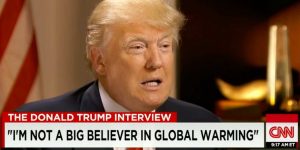By Professor Catriona McKinnon (Director, Leverhulme Programme in Climate Justice)
Later this week, a climate denier will become the President of the United States. Donald Trump claims that ‘nobody really knows’ whether climate change is happening, and has asserted in the past that climate change is a hoax. To make things worse, Trump has filled his cabinet with several climate deniers, and his transition team have raised fears of a ‘witch hunt’ of climate experts in the Department for Energy.

Today, a letter to the Prime Minister Theresa May, signed by leading figures in the UK climate research community – including some at the University of Reading – expressed fears about what this could do to the evidence base for global climate policy making. If the new Trump administration follows up on his campaign pledges to tear up existing US climate policies, the future could be bleak for the Paris Agreement, which may be the best and last hope for global action on climate change.
Many people in the climate research community are appalled by the climate denial of Trump and his incoming cabinet. But what, exactly, is wrong with it?
The climate denial of Trump and his cabinet is not bad science: it is not science at all
One thought might be that Trump’s climate denial is outrageously bad science. The essence of science is contestation and disagreement, and science in a state of health makes space for mavericks who strike out with bold new hypotheses, sometimes enabling great leaps forward. Should we be horrified by Trump’s denial because he does not fit this mould? This would be a serious mistake. The climate denial of Trump and his cabinet is not bad science: it is not science at all.
Such views have grown from a set of organised, well-funded, strategic, deceptive, ideological practices undertaken by a range of conservative think tanks in the US, funded by those with fossil fuel interests, and which have perverted climate legislation in America. The tactics these deniers employ include claims of conspiracy among climate scientists, appeal to fake experts, cherry-picking data, and outright deception.
High stakes of climate risks
So he says he doesn’t believe the experts. So what? To understand why Trump’s climate denial is so heinous we must be alive to the severity of the climate crisis and how little time is left to take meaningful action to contain it.
Continue reading →



